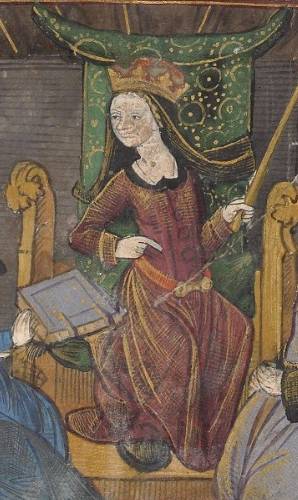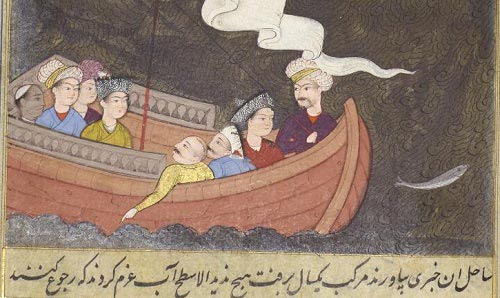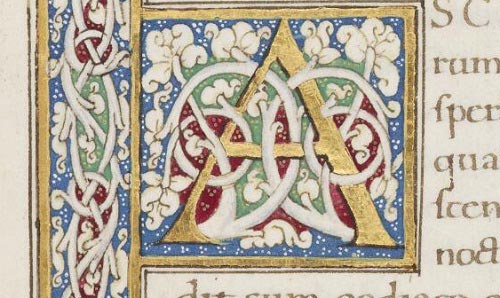
European Literature Collections
The Library has outstanding holdings of literature in the Romance languages, especially late medieval and early modern. There are also some small but significant collections from the 19th and 20th centuries.

The two areas of international significance which map directly to areas of current teaching and research activity at The University of Manchester are Italian and French, with smaller holdings of German literature in manuscript and print.
Holdings of books printed in Italy from the 15th century onwards are world-leading, the most important author collection being that of Dante Alighieri. Likewise, our holdings of French books printed in the 15th and 16th centuries are extremely strong, especially for French literature and humanist scholarship. There are significant collections of German literature, ranging from medieval manuscripts to the 20th-century Modernist movement.
It should also be noted that the Western European Manuscripts include small but significant collections of Dutch, Icelandic and Spanish manuscripts.
Italian
Our holdings of books printed in Italy from the 15th century onwards are extremely strong, thanks in large part to the Spencer, Christie and Bullock collections, all of which are rich in Italian literature. The most important author collection is that of Dante Alighieri, including all but one of the 15th-century editions of the Divina Commedia, and many of the subsequent major editions, including the first Roman edition with Lombardi’s commentary of 1791. Six early editions have been digitised and are available online. The collection of original editions is supported by numerous commentaries.
Other significant authors are Ariosto, Sannazaro, Boccaccio, Tasso, Guarini, Machiavelli and Petrarch, while secondary writers include the poet Benedetto Varchi, dramatist Sperone Speroni, and humanist Gian Giorgio Trissino. We also have particular strengths in the outputs of a number of Italian printers, including Aldus Manutius and his descendants, the Giunti family and Gabriel Giolito de Ferrari. There is also significant material relating to the Italian language, including early dictionaries and texts recording regional language differences and dialects.
The archive and manuscript collections hold exceptionally rich material for researchers. Italian manuscripts date from the 14th to the 19th centuries, with particular strengths in literature, genealogy, music and history. We also have documents concerning Florence, Venice, Bologna and other cities, and records relating to the Medici, Strozzi and Orsini families.
French
There are a number of significant collections for the study of French language, literature and culture. The Library holds numerous medieval and Renaissance manuscripts written in both French and Latin, many of which are richly illuminated and of major importance. Our holdings of books printed in the 15th and 16th centuries are extremely strong, especially for French literature and humanist scholarship. For the 17th century, there is an outstanding collection of over 1,800 Mazarinades documenting the period of La Fronde in the 1650s. The extensive correspondence of Marie le Bailleul, Marquise d’Huxelles, sheds light on the social and political history of France in the reign of Louis XIV. The French Revolution Collection is an internationally significant collection of newspapers, periodicals and books from the Revolutionary and Napoleonic periods.
The collection of Robert Shackleton, Professor of French Literature at Oxford University, covers 18th- and 19th-century French studies, especially literature, philosophy and civilization, with some 3,000 works published before 1850. The major figures of the French Enlightenment such as Fontenelle, Voltaire, Helvétius, Diderot and d’Holbach are all well represented. There is particularly good coverage of the long-running Jansenist controversy, for example. Other strengths of the collection include encyclopaedias, dictionaries and reference works, and travel literature.
There are also archives and printed collections relating to major French writers of the 19th and 20th centuries, in particular Alexander Dumas, Victor Hugo, Jules Laforgue, Marcel Proust, Amable Tastu, Octave Mirbeau and Joséphin Aimé Péladan.
German
In addition to French and Italian literature, there are significant holdings of German literature, ranging from medieval manuscripts produced in Bremen, Erfurt, Essen, Murbach, Trier and Weissenau, to the 20th-century Modernist movement. The Library holds a fine collection of 16th-century tracts and other publications associated with Protestant reformers from German-speaking lands, such as Martin Luther, Ulrich von Hutten, Philipp Melanchthon and Huldrych Zwingli. The collection includes a copy of Luther’s Disputatio or Ninety-five Theses, of 1517.
The Teltscher Collection concerns Judaism, Jewish history and the practice of Judaism across a variety of European languages, including German, from the 1550s to the 20th century. The collection is particularly strong on the history and culture of Jewish communities in central and eastern Europe in the early part of the 20th century. The Library also holds eight volumes of the papers of August Heinrich Simon (1805–1860), a German-Jewish lawyer and leading member of the revolutionary Frankfurt Parliament of 1848.
The Children’s Printed Collection includes numerous editions, translations and imitations of the German children’s picture book Der Struwwelpeter (Shockheaded Peter), written by Heinrich Hoffmann (1809-1894), from the collection of Professor David Blamires.
Modern German literature is represented by the papers and book collection of the 20th-century poet Peter Huchel (1903-1981).
List of collections
Physical collections
- Aldine Collection
- Lodovico Ariosto Printed Works
- Giovanni Boccaccio Printed Works
- Bullock Collection
- Children's Printed Collection
- Christie Collection
- Dante Alighieri Printed Works
- French Manuscripts
- French Revolution Collection
- German Manuscripts
- Giovanni Battista Guarini Printed Works
- Peter Huchel Collection of German Literature
- Victor Hugo Book Collection
- Victor Hugo Collection
- Italian Manuscripts
- Lloyd Roberts Collection
- Niccolò Machiavelli Printed Works
- Mazarinades Collection
- Records of the Medici Family of Florence
- K. G. Millward Collection
- Douglas Munro Alexandre Dumas père Collection
- Francesco Petrarch Printed Works
- Marie Riefstahl Nordlinger Proust Collection
- Giovanni Pontiero Papers
- Shackleton Collection
- Heinrich Simon Papers
- Spencer Collection
- Torquato Tasso Printed Works
- Amable Tastu Papers
- Teltscher Collection
- Eugène Vinaver Collection
Digital collections
Further information

Exploring subject areas
An overview of our Special Collections, including information about the background and history of our holdings.

Special Collections A-Z
Explore the Special Collections through the collection names and descriptions using our searchable A-Z tool.
